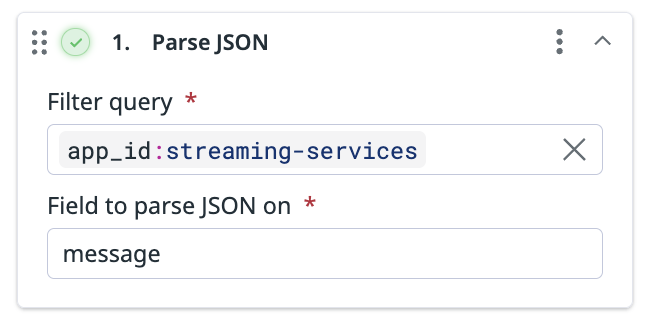- 重要な情報
- はじめに
- 用語集
- Standard Attributes
- ガイド
- インテグレーション
- エージェント
- OpenTelemetry
- 開発者
- Administrator's Guide
- API
- Partners
- DDSQL Reference
- モバイルアプリケーション
- CoScreen
- CoTerm
- Remote Configuration
- Cloudcraft
- アプリ内
- ダッシュボード
- ノートブック
- DDSQL Editor
- Reference Tables
- Sheets
- Watchdog
- アラート設定
- メトリクス
- Bits AI
- Internal Developer Portal
- Error Tracking
- Change Tracking
- Service Management
- Actions & Remediations
- インフラストラクチャー
- Cloudcraft
- Resource Catalog
- ユニバーサル サービス モニタリング
- Hosts
- コンテナ
- Processes
- サーバーレス
- ネットワークモニタリング
- Cloud Cost
- アプリケーションパフォーマンス
- APM
- Continuous Profiler
- データベース モニタリング
- Data Streams Monitoring
- Data Jobs Monitoring
- Data Observability
- Digital Experience
- RUM & セッションリプレイ
- Synthetic モニタリング
- Continuous Testing
- Product Analytics
- Software Delivery
- CI Visibility (CI/CDの可視化)
- CD Visibility
- Deployment Gates
- Test Visibility
- Code Coverage
- Quality Gates
- DORA Metrics
- Feature Flags
- セキュリティ
- セキュリティの概要
- Cloud SIEM
- Code Security
- クラウド セキュリティ マネジメント
- Application Security Management
- Workload Protection
- Sensitive Data Scanner
- AI Observability
- ログ管理
- Observability Pipelines(観測データの制御)
- ログ管理
- CloudPrem
- 管理
Parse JSON Processor
This product is not supported for your selected Datadog site. ().
This processor parses the specified JSON field into objects. For example, if you have a message field that contains stringified JSON:
{
"foo": "bar",
"team": "my-team",
"message": "{\"level\":\"info\",\"timestamp\":\"2024-01-15T10:30:00Z\",\"service\":\"user-service\",\"user_id\":\"12345\",\"action\":\"login\",\"success\":true,\"ip_address\":\"192.168.1.100\"}"
"app_id":"streaming-services",
"ddtags": [
"kube_service:my-service",
"k8_deployment :your-host"
]
}
Use the Parse JSON processor to parse the message field so the message field has all the attributes within a nested object.

This output contains the message field with the parsed JSON:
{
"foo": "bar",
"team": "my-team",
"message": {
"action": "login",
"ip_address": "192.168.1.100",
"level": "info",
"service": "user-service",
"success": true,
"timestamp": "2024-01-15T10:30:00Z",
"user_id": "12345"
}
"app_id":"streaming-services",
"ddtags": [
"kube_service:my-service",
"k8_deployment :your-host"
]
}
To set up this processor:
- Define a filter query. Only logs that match the specified filter query are processed. All logs, regardless of whether they do or do not match the filter query, are sent to the next step in the pipeline.
- Enter the name of the field you want to parse JSON on.
Note: The parsed JSON overwrites what was originally contained in the field.
Filter query syntax
Each processor has a corresponding filter query in their fields. Processors only process logs that match their filter query. And for all processors except the Filter processor, logs that do not match the query are sent to the next step of the pipeline. For the Filter processor, logs that do not match the query are dropped.
The following are logs filter query examples:
NOT (status:debug): This filters for logs that do not have the statusDEBUG.status:ok service:flask-web-app: This filters for all logs with the statusOKfrom yourflask-web-appservice.- This query can also be written as:
status:ok AND service:flask-web-app.
- This query can also be written as:
host:COMP-A9JNGYK OR host:COMP-J58KAS: This filter query only matches logs from the labeled hosts.user.status:inactive: This filters for logs with the statusinactivenested under theuserattribute.http.status:[200 TO 299]orhttp.status:{300 TO 399}: These two filters represent the syntax to query a range forhttp.status. Ranges can be used across any attribute.
Learn more about writing filter queries in Observability Pipelines Search Syntax.
